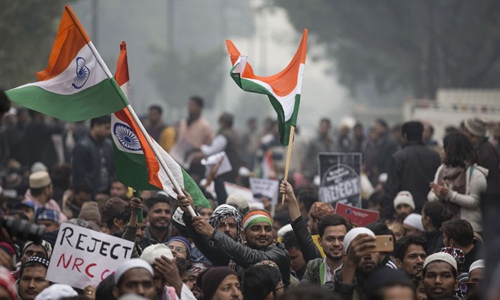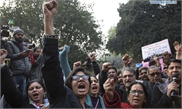Indian authorities order 28 people to compensate for protest damages

People participate in a protest against the new citizenship law in New Delhi, India, Dec. 19, 2019. Photo:Xinhua
Authorities in the northern Indian state of Uttar Pradesh have sent notices to at least 28 people, seeking recovery for the damages caused during the violence last week over a controversial new citizenship law, officials said Wednesday.
"Assessment of damage has been done and notices were issued to 28 identified people for the recovery of damages," Aunjaneya Kumar Singh, a senior government official in Rampur district told media.
"Those who were involved in the destruction of public property have been identified through CCTV footage and their names have been sent by police," the official said.
The crackdown by the local authorities comes after Uttar Pradesh Chief Minister Yogi Adityanath's warning that his government will take revenge on those involved in damaging public assets by auctioning their properties to compensate for the loss.
Among many towns in Uttar Pradesh, violence also broke out in Rampur during the citizenship law protests.
Reports said the authorities have asked the 28 people (majority of whom are street vendors) to pay for the damages caused to vehicles, police helmets, batons and pellets during the violence.
As per the assessment made by the administration, Rampur town suffered damage of 20,769 U.S. dollars during the protests.
More than 60 shops in Muzaffarnagar were sealed last week as part of the crackdown.
Authorities recently said they had detained 5,205 people, out of which 705 were arrested across the state.
At least 15 people were killed during protests across Uttar Pradesh last week. The police chief in the state said his men had not fired a single bullet at protesters anywhere.
Protests erupted on Dec. 11, the day India's upper house of parliament passed the law. Since then there has been no let-up in the protests.
The law aims at granting citizenship to illegal immigrants belonging to six religions -- Hinduism, Sikhism, Buddhism, Jainism, Parsi and Christianity -- from Bangladesh, Afghanistan and Pakistan. However, it has kept out Muslim immigrants from applying for citizenship.
Opposition parties and civil society members in India criticize the law as contrary to secular principles enshrined in India's constitution as it excludes Muslims.
Indian Prime Minister Narendra Modi and his home minister Amit Shah have tried to dispel fears surrounding the new law.
The countrywide death toll against the controversial new citizenship law in India stands at 22.

